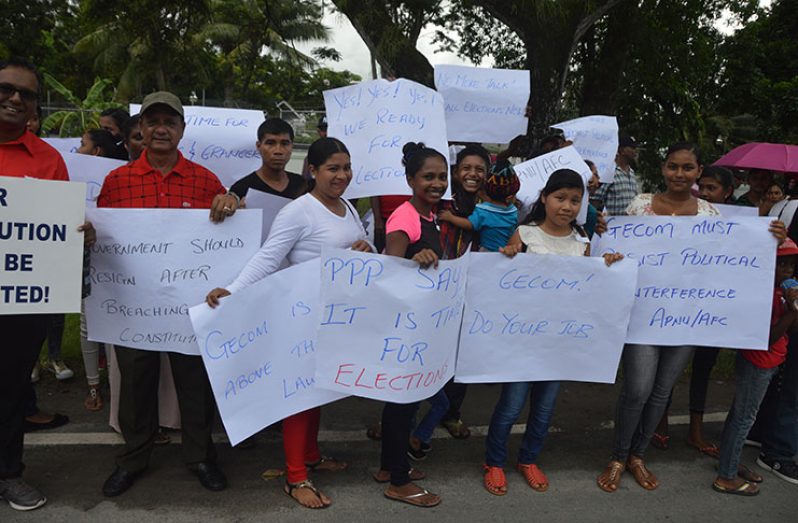ONE day after its leader met with the President to set in motion a process to hammer out nominees to be considered for the post of chairman of the Guyana Elections Commission, supporters of the opposition – People’s Progressive Party – was on the street braving heavy showers calling for President David Granger to set a date for early elections.
President Granger has insisted that he will be guided by the advice of GECOM before naming a date for elections.
The demand comes at a time when the Guyana Elections Commission (GECOM) is without a Chairman, and has indicated that it is unable to hold elections before December 25, 2019. It is also being made at a time when the Caribbean Court of Justice (CCJ) is preparing to make a series of consequential orders as a follow-up to its decision that the December 21 no-confidence motion was validly passed. Ahead of those orders, GECOM’s lawyer, Senior Counsel Stanley Marcus, on June 24, told the court that the compilation of the new Voters’ List would be completed by December 25 after which, the Elections Commission would be in a position to facilitate free, fair and credible elections.
Notwithstanding the facts surrounding the matter, droves of PPP supporters, led by the party’s Presidential Candidate, Irfaan Ali, demanded early elections. Ali told reporters now that the CCJ has validated the no-confidence motion, the President should name a date within the three month period stipulated by the Constitution in Article 106 (7).
“Let me be very clear, a valid no-confidence motion was passed in December, the constitution requires that elections must be held within three months after that passage. The PPP has been patient, the PPP has been responsible, the PPP has been discipline, and the PPP has operated in a nationalist way. We said allow the court issue, and allow all the filings of the government in the court to be concluded and we did that. The CCJ ruled that the no-confidence motion was validly passed, and the Constitution kicks in (and) that requires elections within three months,” Ali said.
Ali also contended that the Constitution stipulates that government must resign immediately following the motion, and on that basis, argued that the government is illegal in office.
However, according to Article 106 (7): “Notwithstanding its defeat, the government shall remain in office and shall hold an election within three months, or such longer period as the National Assembly shall, by resolution supported by not less than two-thirds of the votes of all the elected members of the National Assembly, determine, and shall resign after the President takes the oath of office following the election.
” He insisted that President Granger must name a date for elections, and that Cabinet and the government must resign. “The Cabinet cannot continue to function as if nothing happened,” the PPP/C Presidential Candidate maintained. Article 106 (6) states: “The Cabinet including the President shall resign if the government is defeated by the vote of a majority of all the elected members of the National Assembly on a vote of confidence.”
On the grounds that GECOM is unable to facilitate credible elections at present due to the lack of a valid Voters’ List, the government has invited the PPP/C – the parliamentary opposition, to return to the National Assembly to extend the period for which elections must be held in accordance with the Constitution.
Former President and Prime Minister under the PPP/C regime, Samuel Hinds, was among the protestors. According to him, GECOM must always be in a state of readiness to hold elections, and there is no room for excuses. “GECOM is always supposed to be in a position to call an election within 90 days. GECOM is always required to be able to call an election within 90 days,” he insisted.
But it was under the PPP/C regime that elections were delayed twice. At the time of those delays, Hinds was the Prime Minister, and Bharrat Jadgeo – the President.
In 2001, General and Regional Elections were due on January 17 in accordance with the Herdmanston Accord, however, the then President (Bharrat Jagdeo) had cause to delay the elections based on the advice of the Guyana Elections Commission (GECOM).
Records show that during a November 13, 2000 statutory meeting of the Elections Commission, a decision was taken to advise the then President and leaders of the political parties in the National Assembly that it could not complete arrangements by January 17, 2001. At the time of the decision, 378,223 or 71.66 per cent of the estimated registrants were photographed for their new Identification (ID) cards, and more time was needed to complete the process. The then GECOM Chairman, Major General Jose Singh, had also indicated that more time was needed to train polling day staff.
On Friday, November 17, 2000 GECOM had made public its inability to hold elections by January 17, 2001, and the international donor community, which was helping to fund the electoral process, had made it clear that the “date of the forthcoming election is a matter solely for the Guyana Elections Commission to recommend.” Again in 2006 under Jagdeo’s presidency, elections were delayed. The constitutional deadline was August 4, 2006 but GECOM was unable to meet it.




.jpg)









